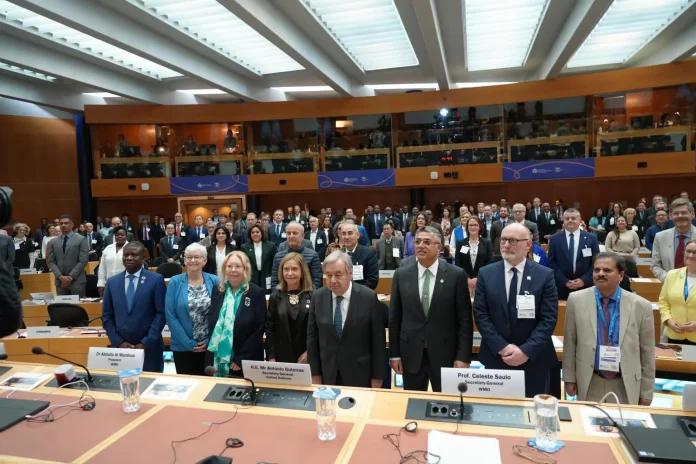The World Meteorological Organization (WMO) has endorsed the use of Artificial Intelligence (AI) to improve weather forecasts and early warnings, aiming to ensure universal coverage of early warning systems through the Early Warnings for All initiative by end of 2027.
An Extraordinary World Meteorological Congress issued a call to public, private, and academic sectors to collaborate on developing AI and machine learning (ML) technologies to protect communities and economies from hazards like extreme heat and rainfall. The resolutions pave the way for AI and ML to be anchored in WMO’s global observation, data processing, and forecasting backbone.
The measures approved by the Extraordinary Congress aim to accelerate progress toward WMO’s top priority of ensuring universal coverage of early warning systems through the Early Warnings for All initiative by the end of 2027.
“Early warnings are not an abstraction,” United Nations Secretary-General António Guterres stated, adding that disaster-related mortality is at least six times lower in countries with good early warning systems in place.
Guterres, who launched Early Warnings for All in 2022, noted that 24 hours’ notice before a hazardous event can reduce damage by up to 30 percent. The high-level event was opened by Mozambique President Daniel Francisco Chapo and featured an urgent Call to Action from WMO Secretary-General Celeste Saulo.
Congress approved new technical regulations concerning early warning services, ensuring that National Meteorological and Hydrological Services (NMHSs) maintain their authoritative role in issuing reliable warnings. The resolution builds on decisions by the WMO Executive Council in June 2025, reaffirming that AI must complement, not replace, existing scientific forecasting methods and infrastructure.
The resolution emphasizes open data, open-source tools, and FAIR principles to foster transparency and global participation. It calls for ethical frameworks establishing principles for cooperation, intellectual property, and responsible AI use.
Congress stressed the need to support NMHSs globally, especially in low and middle-income countries, Least Developed Countries (LDCs), and Small Island Developing States (SIDS), to access and utilize new AI technology. The WMO Integrated Processing and Prediction System (WIPPS) is a worldwide network that makes scientific and technological advances accessible to members.
An ongoing pilot project between the meteorological services of Norway and Malawi, demonstrating AI weather prediction and Forecasts in a Box, showed improvements in forecasts and is being watched as a model for other countries with resource constraints.
The Extraordinary Congress also advanced Global Greenhouse Gas Watch goals, approved WMO’s first Youth Action Plan, streamlined procedures for Secretary-General elections, and endorsed organizational restructuring to address evolving global challenges and financial constraints.
Source: newsghana.com.gh











